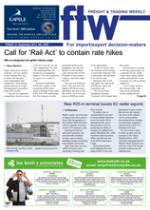There have been serious
congestion delays over the
past week at Pier 1 in the
Port of Durban, with trucks
backing up some distance
along the only access,
Bayhead Road.
As a result Transnet Port
Terminals (TPT) declared
force majeure at the container
terminal Pier 1 following
illegal industrial action in
the form of a go-slow by
employees, according to
a notification from DCT
terminal executive manager
Hector Danisa.
“The situation is that the
illegal industrial action has
affected productivity and led
to delays and backlog in the
movement of cargo through
the terminal,” according to
the notification.
“Unfortunately this
disturbance and its effects
are beyond the control of
TPT which has no option but
to invoke the provisions of
the force majeure clause in
terms of TPT’s commercial
agreements.”
But, when TPT declared
this force majeure (FM),
a number of voices in
the private sector freight
industry questioned whether
they actually had the right to
deny claims from contracted
clients because of strike
action by their own work
force.
Two legal contacts of
FTW, Quintus van der
Merwe of Shepstone &
Wylie and Andrew Robisnon
of Norton Rose – both
specialists in the freight and
trade areas of business –
gave us their views on the
force majeure issue.
Both confirmed that the
term force majeure within
the context of SA law did not
have any precise definition,
nor was it recognised as
any special doctrine. Its
significance in respect of our
law depends on its use as an
express term in a contract.
Therefore, if TPT wished
to use force majeure as a
defence against claims,
it could not declare this
generally to its public. It
would need to be contained
within contracts with
individual clients.
SA law, however,
recognises the concept of
supervening impossibility
of performance – where
an obligation cannot be
performed due to a cause
beyond the performer’s
reasonable control.
The three causes usually
recognised are: Act of
God, vis maior and casus
fortuitus – all of which are,
very distinctly, forces beyond
one’s control.
The main question was
whether TPT could claim
that the strike was out
of their control – which
effectively stated that the
port management was not in
control of its own work force.
The two lawyers were
agreed. “It could be difficult
for employers to declare
force majeure when their
own labour is on strike.”
CAPTION
Hector Danisa … ‘Disturbance and
its effects are beyond the control
of TPT.’

